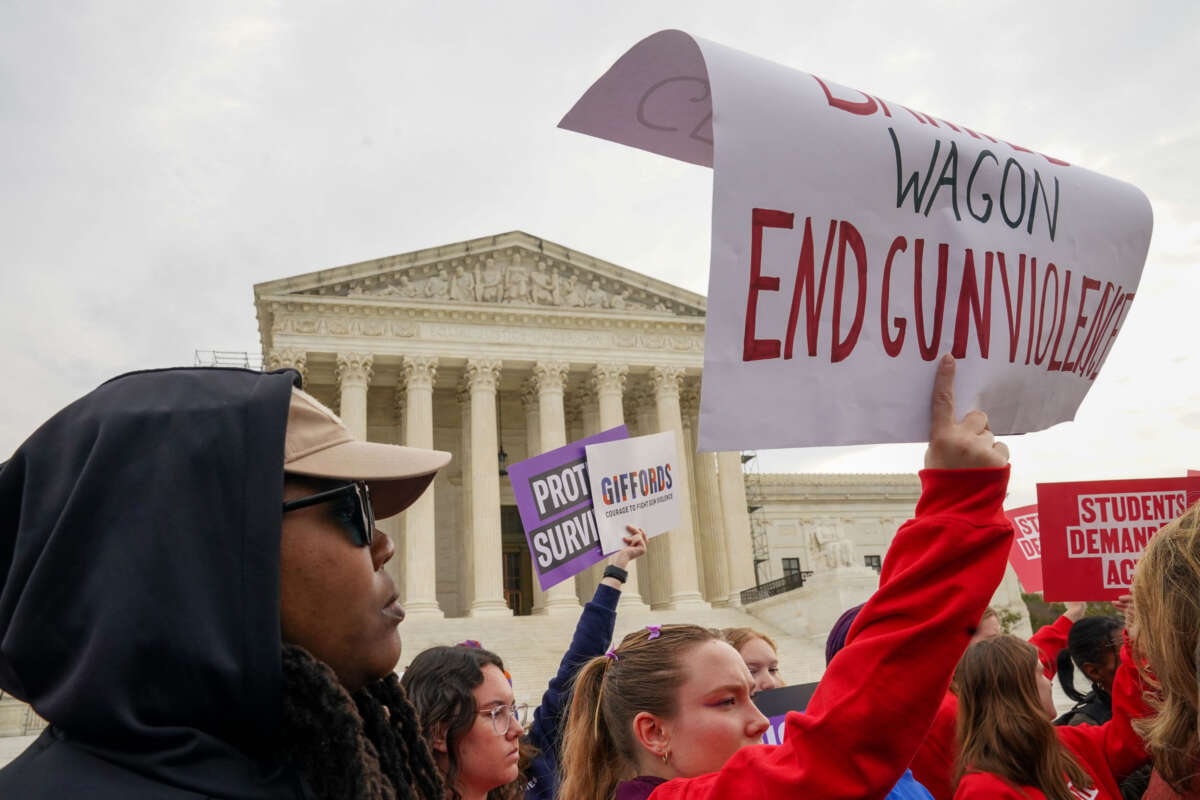Honest, paywall-free news is rare. Please support our boldly independent journalism with a donation of any size.
The Supreme Court on Friday upheld a federal law that prevents someone under a domestic violence restraining order from possessing firearms in the case of United States v. Rahimi.
The decision was 8-1, with Justice Clarence Thomas casting the dissenting vote.
In 2019, Zackey Rahimi physically assaulted his girlfriend in a parking lot in Texas and then told her that if she talked to the police about it, he would shoot her. Later, a state court granted her a domestic violence restraining order.
Rahimi then threatened a different woman with a gun and was charged with assault with a deadly weapon. He shot guns in public on five more occasions, firing an AR-15 assault rifle into the home of someone who had once bought drugs from him and shooting into the air at a fast food restaurant when a friend’s credit card was declined. When police conducted a legal search of Rahimi’s home, they found multiple firearms and rounds of ammunition.
Under a 1994 federal law, anyone with an active domestic violence restraining order against them is barred from possessing or purchasing firearms. Rahimi was charged with violating that law.
In June 2022, the Supreme Court ruled in New York State Rifle & Pistol Association v. Bruen that any restriction on firearms must be “consistent with the Nation’s historical tradition” — meaning that it must have a point of reference rooted in the time of the Constitution’s signing. At the time of America’s founding, domestic violence restraining orders did not exist — nor were women, who are disproportionately impacted by domestic violence, considered full citizens. Thomas wrote that this precedent superseded the long-standing practice of allowing the government to weigh its interest in public safety against the possibility of imposing a limitation on Second Amendment rights.
As a result of this ruling, the U.S. Court of Appeals for the 5th Circuit reversed its original conviction of Rahimi, saying a domestic violence restraining order could not be used to justify restricting Rahimi’s right to bear arms.
“Our country has stood at a tipping point, with the safety of survivors of domestic violence on the line. But today, we took a step toward protecting millions from their abusers,” said Janet Carter, senior director of issues and appeals at Everytown Law, in a statement after the decision. “This is a major victory for gun safety in the courts, but make no mistake — we should not have been here in the first place. Lower court judges should never have been allowed to put their interpretation of early American history ahead of the lives of countless women and families across the country.”
A domestic violence restraining order is a protective measure issued by a civil court. While the specifications of what these orders do can vary by state, they generally require a person accused of abuse to stop harming or threatening a victim; stay physically away from a victim’s home, workplace and school; and cease all communication with a victim. To receive such an order, an accuser must petition a civil judge and provide evidence. Civil courts’ evidentiary standard is a “preponderance of evidence,” a burden of proof below what is required for a conviction in criminal courts. If a judge finds that a preponderance of evidence shows proof of abuse, stalking, harassment or any other form of domestic or intimate partner violence, they will grant the accuser a domestic violence restraining order.
Women, LGBTQ+ people and those from marginalized backgrounds are disproportionately impacted by domestic violence. Women in the United States are 11 times more likely to be killed with a firearm than women in other high-income countries, female intimate partners are more likely to be killed with a gun than all other means combined, and the presence of a gun increases the risk of homicide for women in domestic violence situations by 500 percent. One in 4 women in the United States has been the victim of severe domestic violence injury in her lifetime, and 1 in 3 women in the United States has experienced rape, stalking or domestic violence.
“Today’s decision from the Supreme Court is a powerful reminder that the gun lobby cannot — and will not — be the arbiter of the lives of women and families across the country,” said Angela Ferrell-Zabala, executive director of Moms Demand Action, in a statement released after the decision. “Our movement has been fighting against the gun lobby’s extreme agenda for over a decade, and made it known that this decision would have had deadly consequences.”
A terrifying moment. We appeal for your support.
In the last weeks, we have witnessed an authoritarian assault on communities in Minnesota and across the nation.
The need for truthful, grassroots reporting is urgent at this cataclysmic historical moment. Yet, Trump-aligned billionaires and other allies have taken over many legacy media outlets — the culmination of a decades-long campaign to place control of the narrative into the hands of the political right.
We refuse to let Trump’s blatant propaganda machine go unchecked. Untethered to corporate ownership or advertisers, Truthout remains fearless in our reporting and our determination to use journalism as a tool for justice.
But we need your help just to fund our basic expenses. Over 80 percent of Truthout’s funding comes from small individual donations from our community of readers, and over a third of our total budget is supported by recurring monthly donors.
Truthout’s fundraiser ended last night, and we fell just short of our goal. But your support still matters immensely. Whether you can make a small monthly donation or a larger one-time gift, Truthout only works with your help.
